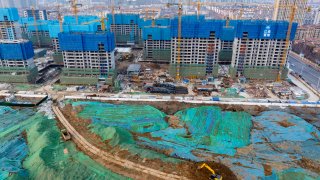
- China's policymakers are doing little to soothe concerns about the economy and especially the property sector, Brian McCarthy, chief strategist at Macrolens told CNBC.
- The People’s Bank of China cut the benchmark 5-year loan prime rate by 25 basis points earlier this week, in what many view as an attempt to boost the property market.
- Mortgage rates are often pegged to this 5-year loan prime rate, but they aren't the only issue, Wei Yao, head of research and chief economist for Asia-Pacific at Société Générale, told CNBC.
Policymakers are doing little to soothe concerns surrounding China's ailing economy, Brian McCarthy, chief strategist at Macrolens told CNBC's "Street Signs Asia" on Wednesday.
"Chinese policymakers are going to continue to struggle to give the market what it wants, and what it needs, which is really some kind of plan to extract the economy from debt deflation in the wake of a massive property bust," he said.
The latest monetary policy announcement from the People's Bank of China (PBOC) saw the central bank cut the benchmark 5-year loan prime rate by 25 basis points earlier this week.
Many observers saw the move as an effort to boost the country's struggling property market, as the majority of mortgages are pegged to this rate.
"The intention is clear here that the PBOC wanted to do more to stabilize housing," Wei Yao, head of research and chief economist for Asia-Pacific at Société Générale, told CNBC's "Squawk Box Asia" on Wednesday.
Money Report
A stabler housing sector is key to steadying the overall economy, she added.
Beijing's financial markets have been under pressure, as recent data has indicated that the world's second-largest economy may be slowing down, deflation remains persistent and the country's CSI 300 appears to be struggling. The economic issues have raised questions about the outlook for local investment.
Policymakers have been trying to counteract the trend with what McCarthy called "a string of half measures that, you know, weren't really satisfying market participants at all."
The 5-year loan prime rate cut was a more "aggressive" move within these decisions, he added.
But it isn't just about house borrowing costs, Société Générale's Yao said.
"The hope is that lower mortgage rates could revive sales, but actually the mortgage rates have fallen a lot over the past year or so but the sales have not yet stabilized. So clearly it's not just the interest rates," she explained.
Changing long-term expectations for housing prices and concerns that property developers will not complete buildings they have already sold also play a role, Yao said.
Property developers have been at the center of the crisis in China, given construction restrictions during the Covid-19 pandemic and mounting financing issues due to a 2020 crackdown on debt reliance.
Many property developers are "effectively walking dead," McCarthy says, and they are being kept alive by Beijing to eventually complete their building projects. This has also prevented a bigger blow-up than some had been expecting, he suggests.
McCarthy also questioned why Chinese authorities have not brought the struggling developers together into an entity that would be more attractive to lenders to help them complete their projects.
"I'm left to decide that they don't do that because they've come to the conclusion that the problem's a little too big to swallow," he said.
Measures that channel liquidity to developers could eventually have a positive impact, Yao said.
"It's just a start, we need to see how effective it is, but we think, with all the action, in the second half there is a chance that the housing can finally stabilize."






